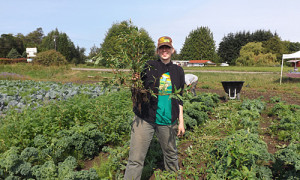Get those weeds!
Nature abhors bare ground and will cover it whenever possible with vegetation, but if soil has been left bare, or damaged, the plants that move in first are usually what we consider weeds. If left alone, they will be eventually shaded out by larger and leafier plants, but their job is prevent erosion and to fix nitrogen in the soil.
Organic farmers deal with weeds mechanically or manually throughout the growing season and do their best to put down cover crops right after harvest in the fall to prevent weeds from getting a foothold in the fields. Sometimes they deal with a weed by changing their attitude towards it, like with chickweed. It may be a “weed,” but it is edible, and it holds moisture in the soil for all the plants. If the crop can get a decent head start, the chickweed will not have too much of a negative impact, and will die off during the summer, adding organic material to the soil.
Other weeds, like smartweed, aka knotweed, can take over a field and choke out the crop. We were having a problem in the South Wilson field with smartweed, but thanks to a group of intrepid volunteers who came to our farm on Saturday, August 16, as part of the “All in for Farms” event organized by PCC Farmland Trust, we think we got a pretty good handle on it. They came from Seattle and the Kitsap Peninsula and worked for half a day. We are very grateful for their help! In the photo, Stephanie Mosher of Kitsap holds up a giant smartweed she pulled out of the ground.
The rain the preceding week had the mixed effect of making the weeds grow faster, but the soil was softer and the weeds were easier to pull out of the ground.
If you have friends or family who would like to get some fresh organic veggies, we have a new program where we exchange one box of produce for 3 hours weeding, or other farm work. We offer an orientation and the exchanger can come when they want and work as long or as short as they are comfortable. Call 360-681-7458 for more information.

